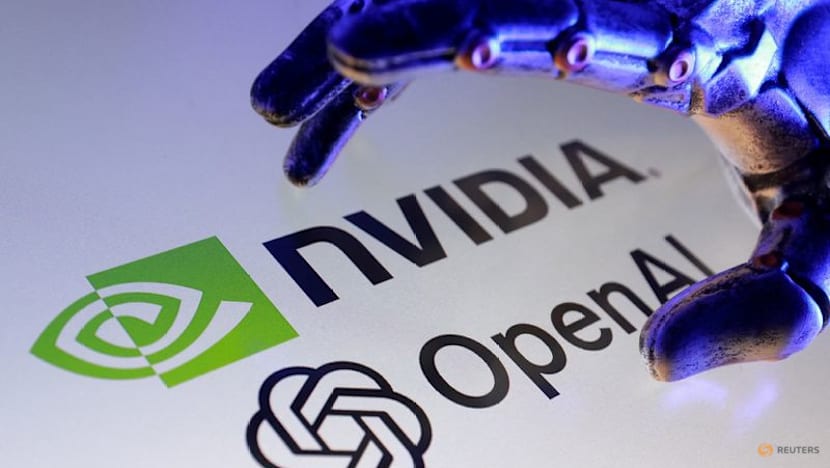Nvidia's $100 billion OpenAI play raises big antitrust issues

FILE PHOTO: Nvidia and OpenAI logos are seen in this illustration taken, September 22, 2025. REUTERS/Dado Ruvic/Illustration/File Photo
The $100 billion partnership between dominant AI chipmaker Nvidia and leading artificial intelligence company OpenAI could give both companies an unfair advantage over their competitors, experts say.
The move underscores the increasingly overlapping financial interests of the various tech giants developing advanced AI systems, and the potential for a dwindling number of key players to stave off smaller rivals.
It "raises significant antitrust concerns," said Andre Barlow, an antitrust lawyer with Doyle, Barlow & Mazard, who also noted that the Trump administration has taken a pro-business approach to regulations, removing hurdles that would slow AI growth.
And while unleashing U.S. dominance in artificial intelligence by clearing away regulations and creating incentives for growth is a top priority for President Donald Trump, a Department of Justice official said last week that spurring innovation by protecting AI competition through antitrust enforcement is also part of Trump's AI plan.
"The question is whether the agencies see this investment as pro-growth or something that could slow AI growth," Barlow said.
Nvidia holds more than half of the market for the GPU chips that run the data centers powering artificial intelligence models and applications, such as OpenAI's ChatGPT.
That dominant market position raises concerns that Nvidia would favor OpenAI over other customers with better pricing or faster delivery times, said Rebecca Haw Allensworth, an antitrust professor at Vanderbilt Law School.
"They're financially interested in each other's success. That creates an incentive for Nvidia to not sell chips to, or not sell chips on the same terms to, other competitors of OpenAI," Allensworth said.
A Nvidia spokesperson said that its investment in OpenAI would not change its focus.
"We will continue to make every customer a top priority, with or without any equity stake," the spokesperson said.
OpenAI did not immediately respond to a request for comment.
Nvidia's biggest customer base is already relatively concentrated, with the two largest buyers accounting for 23 per cent and 16 per cent of its revenue in the second quarter of this year, according to its financial filings, which do not name the buyers.
The scope of Monday's deal – in which Nvidia would invest up to $100 billion in OpenAI, and the latter would buy millions of chips from Nvidia — goes to show "just how expensive frontier AI has become," said Sarah Kreps, director of the Tech Policy Institute at Cornell University.
"The cost of chips, data centers and power has pushed the industry toward a handful of firms able to finance projects on that scale," Kreps said.
During Joe Biden's presidency, the DOJ and U.S. Federal Trade Commission were on guard against anticompetitive actions by Big Tech companies in the AI space, warning that such companies could use their existing scale to dominate the nascent field.
Under Trump, both agencies have continued other cases against Big Tech companies, and DOJ antitrust division head Gail Slater said on Thursday that enforcement "must focus on preventing exclusionary conduct over the resources that are needed to build competitive AI systems and products."
"The competitive dynamics of each layer of the AI stack and how they interrelate, with a particular eye towards exclusionary behavior that forecloses access to key inputs and distribution channels, are legitimate areas for antitrust inquiry," she said.













